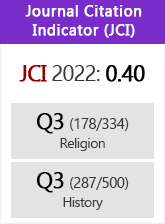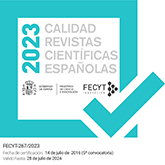The golden legend of Protestantism. Biblical hermeneutics, freedom of conscience and political freedom
DOI:
https://doi.org/10.3989/hs.2018.014Keywords:
Protestant Reformation, Calvin, Bayle, Freedom of conscience, Political freedomAbstract
It is usually assumed that political modernity and the Reformation go hand in hand. Authors such as Hegel, Tocqueville, Jellinek or Martha Nussbaum find in the Protestant Reformation the origin of ideas such as political freedom or freedom of conscience. In this paper, I will try to analyze the relationship between these two concepts in two fundamental characters in the Calvinist tradition. John Calvin, its founding father, on the one hand, and, on the other, Pierre Bayle, the Rotterdam philosopher who pushed Calvinism to its most heterodox forms in the XVII century. I will show how they both understand the interpretation of the Bible and the political arrangements that they defended for their close context.
Downloads
References
Adrián Lara, L. 2015. Dialéctica y calvinismo. Madrid: CEPC.
Bahr, F. 2001. «El Commentaire philosophique de Pierre Bayle: 'Dios no quiere que conozcamos con certeza'». Tópicos 9: 59-80.
Bayle, P. 1750. Dictionnaire Historique et Critique. Amsterdam, Leyde, La Haye, Utrecht. 4 vols. [P. Brunel (ed.)].
Bayle, P. 2012. Corpus Bayle Oeuvres Complètes. Paris: Garnier electronique. [A. McKenna y G. Mori (eds.)].
Bejan, T. 2011. «The Bond of Civility: Roger Williams on Toleration and its Limits». History of European Ideas 37: 409-420. https://doi.org/10.1016/j.histeuroideas.2011.03.003
Bellarmino, R. 1610. Disputationes de controversiis christianae fidei adversus huius temporis haereticos. Lyon.
Calvin, J. 1863-1900. Joannes Calvini opera quae supersunt omnia. Braunschweig. [G. Baum, E. Cunitz y E. Reuss (eds)]. Edición digital:
Calvin, J. 1957-1963. Institution de la religion chrestienne. París: Vrin. 5 vols. [Edición crítica de J. D. Benoît sobre la versión francesa definitiva de 1560].
Calvino, J. 2016. Calvino. Textos políticos. Madrid: Tecnos. [M. García-Alonso (ed.)]. PMCid:PMC5352113
Castilla, F. y Villaverde, M.ª J. 2016. «La leyenda negra: existencia, origen, recepción y reacciones. [Estudio preliminar]», en F. Castilla y M.ª J. Villaverde (eds.), La sombra de la leyenda negra: 11-98. Madrid: Tecnos.
Coleman, J. 2005. «El concepto de república. Continuidad mítica y continuidad real». Res Publica 15: 27-47.
Eisenstein, E. 2005. The printing revolution in Early Modern Europe. Cambridge: Cambridge University Press. https://doi.org/10.1017/CBO9780511819230
Fernández Sebastián, J. 2015. «A Distorting Mirror: The Sixteenth Century in the Historical Imagination of the First Hispanic Liberals». History of European Ideas 41: 166-175. https://doi.org/10.1080/01916599.2014.914309
Fernández Sebastián, J. 2016. «'Los desaciertos de nuestros padres'. Los liberales y la eclosión del llamado 'problema espa-ol'», en F. Castilla y M.ª J. Villaverde (eds.), La sombra de la leyenda negra: 483-510. Madrid: Tecnos.
Fetscher, I. 1995. La tolerancia. Barcelona: Gedisa.
Fuchs, E. 1986. La morale selon Calvin. París: CERF.
García-Alonso, M. 2005. «Poder, derecho y secularización. Un apunte sobre Lutero». Revista de estudios politicos 129: 281-301.
García-Alonso, M. 2008. La teología política de Calvino. Madrid: Anthropos. PMCid:PMC2620662
García-Alonso, M. 2015. «Creencia religiosa y conciencia errónea según Pierre Bayle». Anuario Filosófico 48/ 2: 35-56.
García-Alonso, M. 2016. «Bayle's political doctrine: a proposal to articulate tolerance and sovereignty». History of European Ideas 43/4: 331-344. (http://dx.doi.org/10.1080/01916599.2016.1203593). https://doi.org/10.1080/01916599.2016.1203593
Gillespie, M. A. 2008. The Theological Origins of Modernity. Chicago: University of Chicago Press. https://doi.org/10.7208/chicago/9780226293516.001.0001
Ginzo, A. 2000. Protestantismo y filosofía: la recepción de la Reforma en la filosofía alemana. Madrid: Universidad de Alcalá.
Gómez-Heras, J. M. 1986. Religión y Modernidad. La crisis del individualismo religioso: de Lutero a Nietzsche. Córdoba: Publicaciones del Monte de Piedad y Caja de Ahorros de Córdoba.
Haakonssen, K. 2006. «The History of Eighteenth-Century Philosophy: History or Philosophy?», en K. Haaksonssen (ed.), The Cambridge History of Eigteenth-Century Philosophy: 3-25. Cambridge: Cambridge University Press.
Hegel. 1989. Lecciones sobre la filosofía de la historia universal. Madrid: Alianza. [J. Gaos (ed.)].
Hesselink, J. 1992. Calvin's Concept of the Law. Pennsylvania: Pickwick Publications.
Jacob, M. 1991. Living the Enlightenment: Freemasonry and Politics in Eighteenth-Century Europe. New York: Oxford University Press.
Jacob, M. 2003. The Radical Enlightenment. Pantheists, Freemasons and Republicans. Morristown: The Temple Publishers [segunda edición revisada, original 1981].
Jellinek, G. 1980. Teoría General del Estado. Buenos Aires: Albatros. PMCid:PMC1601181
Jellinek, G. 2000. Declaración de los derechos del hombre y del ciudadano. México: Universidad Autónoma de México.
Kilcullen, J. 1998. «Bayle on the rights of conscience», en Essays on Arnauld, Bayle, and Toleration: 54-105. Oxford: Clarendon Press. PMid:9776858
Labrousse, E. 1964. Pierre Bayle II: Hétérodoxie et rigorisme. Paris: Albin Michel. https://doi.org/10.1007/978-94-010-3598-9
Lambert, T. 1998. Preaching, Praying and Policing the Reform in Sixteenth Century Geneva. Madison: University of Wisconsin.
Laplanche, F. 1986. L'Écriture, le sacre et l'Histoire. Érudits et politiques protestants devant la Bible en France au XVIIe siècle. Amsterdam-Maarsen: APA-Holland University Press.
Laursen, J. C. 2001. «The necessity of conscience and the conscientious persecutor: The paradox of liberty and necessity in Bayle's theory of toleration», en L. Simonutti (ed), Dal necessario al possibile: Determinismo e libertà nel pensiero anglo-holandese del XVII secolo: 211-228. Milan: Angeli.
Laursen, J. C. 2008. «Skepticism, Tyranny and Toleration», en I. Pervova (ed.), Tolerance and intolerance in the Modern Society: the East, the West: 121-130. St Petersburg: St. Petersbourg State University.
Laursen, J. C. 2011. «Skepticism against Reason in Pierre Bayle's Theory of Toleration», en D. Machuca (ed.), Pyrrhonism in Ancient, Modern, and Contemporary Philosophy: 131-144. Springer: Dordrecht.
Lutero. 1983. Luthers Werke Studienausgabe. Berlin: De Gruyter. 4 vols. [O. Clemen (ed.)].
McKenna, A. 2012. «Pierre Bayle: free thought and freedom of conscience». Reformation and Renaissance Review 14/1: 85-100. https://doi.org/10.1179/1462245913Z.0000000006
Monter, W. 1986. «La Réforme au quotidien», en P. Chaunu (dir.), L'Aventure de la Reforme: 284. París : Hermé
Nussbaum, M. 2008. Liberty of conscience: in defense of America's tradition of religious equality. New York: Basic Books.
Pinty, M. 2012. «Protestantism and progress in the year XII: Charles Villers's Essay on the spirit and influence of Luther's Reformation (1804)». Modern Intellectual History 9/2: 303-329. https://doi.org/10.1017/S1479244312000054
Pocock, J. G. A. 1999. Barbarism and Religion, volume 1. The Enlightenments of Edward Gibbon. Cambridge-New York: Cambridge University Press.
Ramis, R. 2015. Petrus Ramus y el Derecho. Madrid: Dykinson. Sheehan, J. 2005. The Enlightenment Bible: Translation, Scholarship, Culture. Princeton.
Tocqueville, A. 2010. De la démocratie en Amérique. Paris: G.F. Flammarion. [P. Raynaud (ed.)]. PMid:20696539
Ullmann, W. 1981. «Calvin and the Duty of Guardians to Resist: a further Comment». Journal of Ecclesiastical History 32: 499-501. https://doi.org/10.1017/S002204690003089X
Villers, Ch. 1804. Essai sur l'esprit et influence de la réformation de Luther. [Texto electrónico: http://www.chez.com/sdg/, acceso febrero 2017].
Witte, J. 2007. The Reformation of Rights: Law, Religion and Human Rights in Early Modern Calvinism. Cambridge: Cambridge University Press.
Downloads
Published
How to Cite
Issue
Section
License
Copyright (c) 2018 Consejo Superior de Investigaciones Científicas (CSIC)

This work is licensed under a Creative Commons Attribution 4.0 International License.
© CSIC. Manuscripts published in both the printed and online versions of this Journal are the property of Consejo Superior de Investigaciones Científicas, and quoting this source is a requirement for any partial or full reproduction.All contents of this electronic edition, except where otherwise noted, are distributed under a “Creative Commons Attribution 4.0 International” (CC BY 4.0) License. You may read here the basic information and the legal text of the license. The indication of the CC BY 4.0 License must be expressly stated in this way when necessary.
Self-archiving in repositories, personal webpages or similar, of any version other than the published by the Editor, is not allowed.














